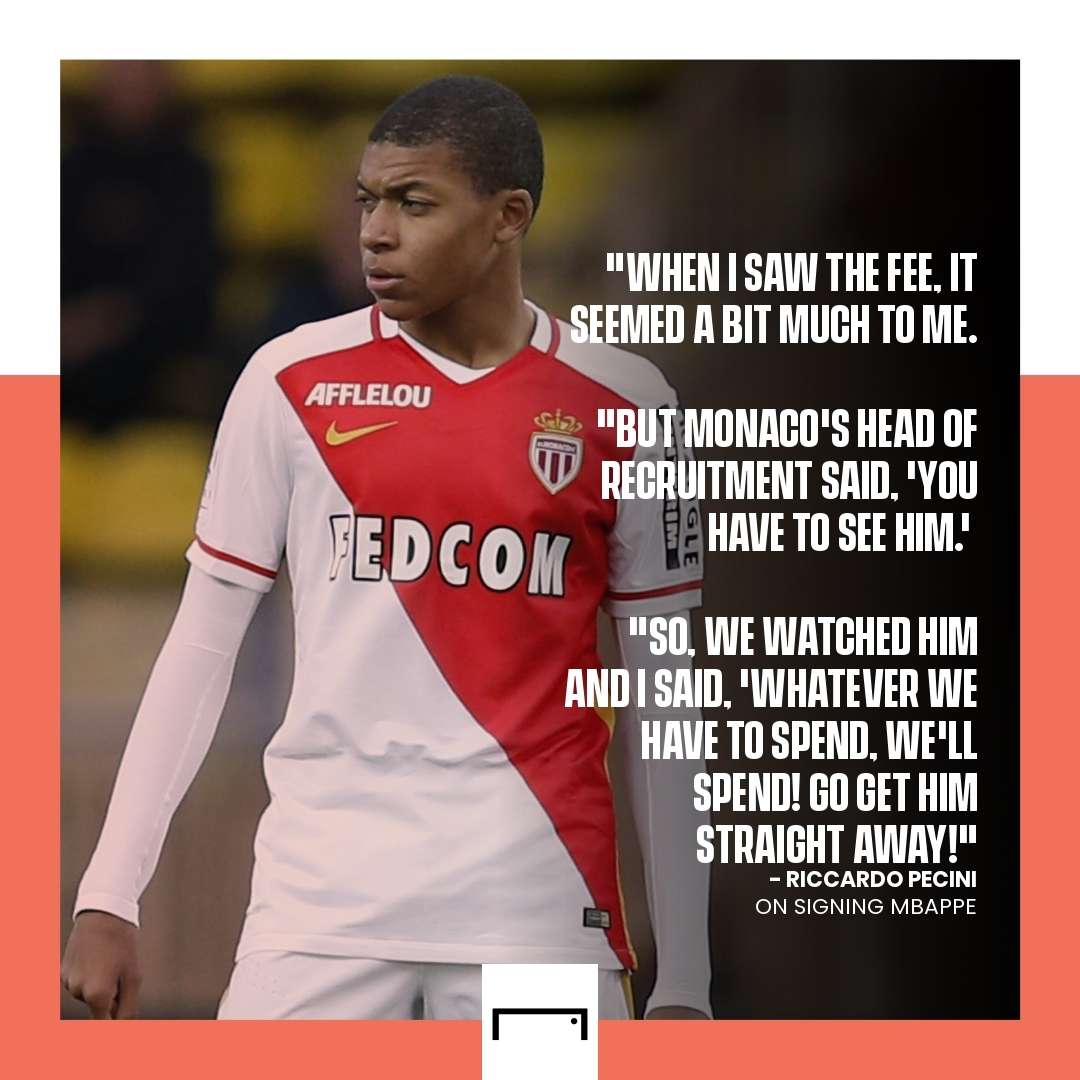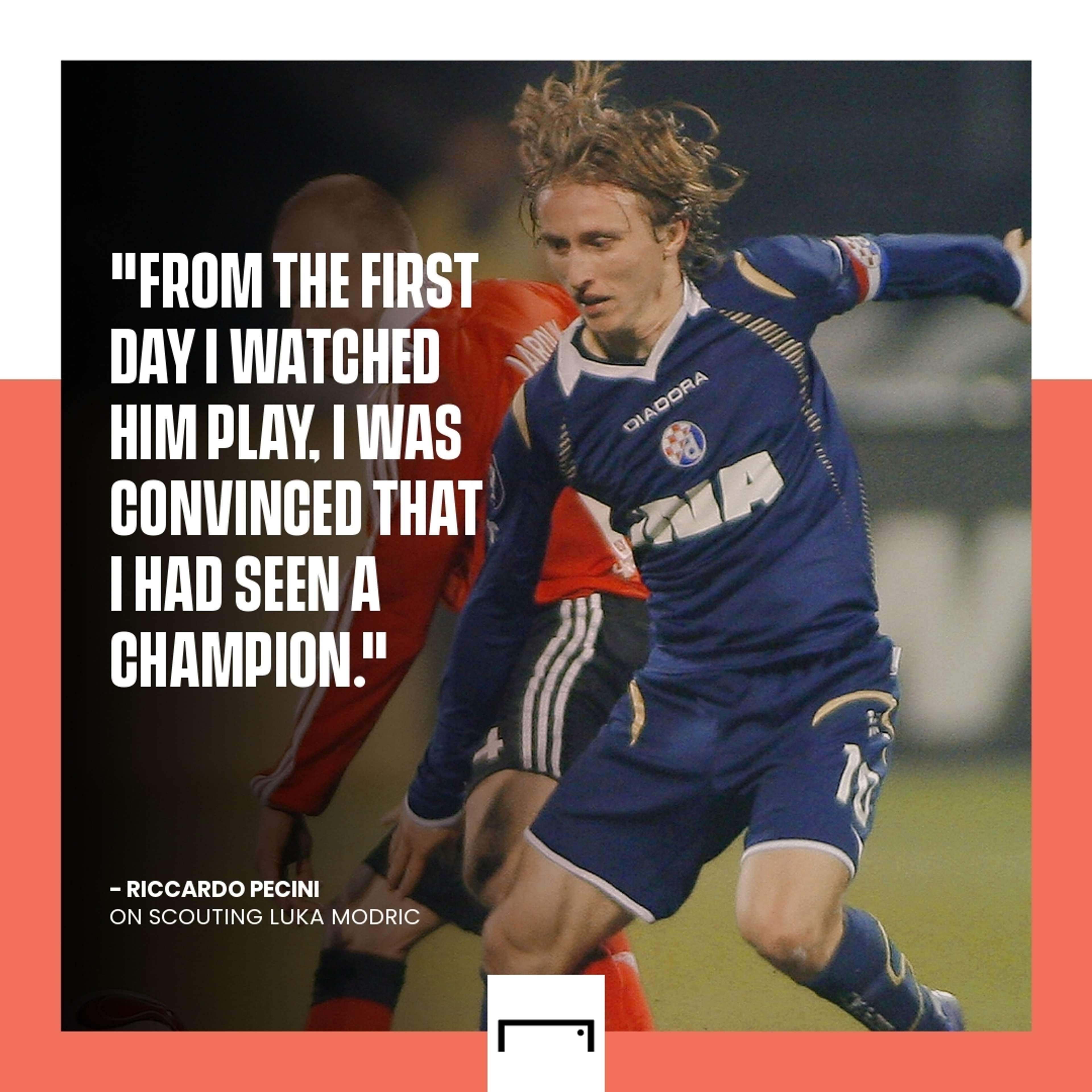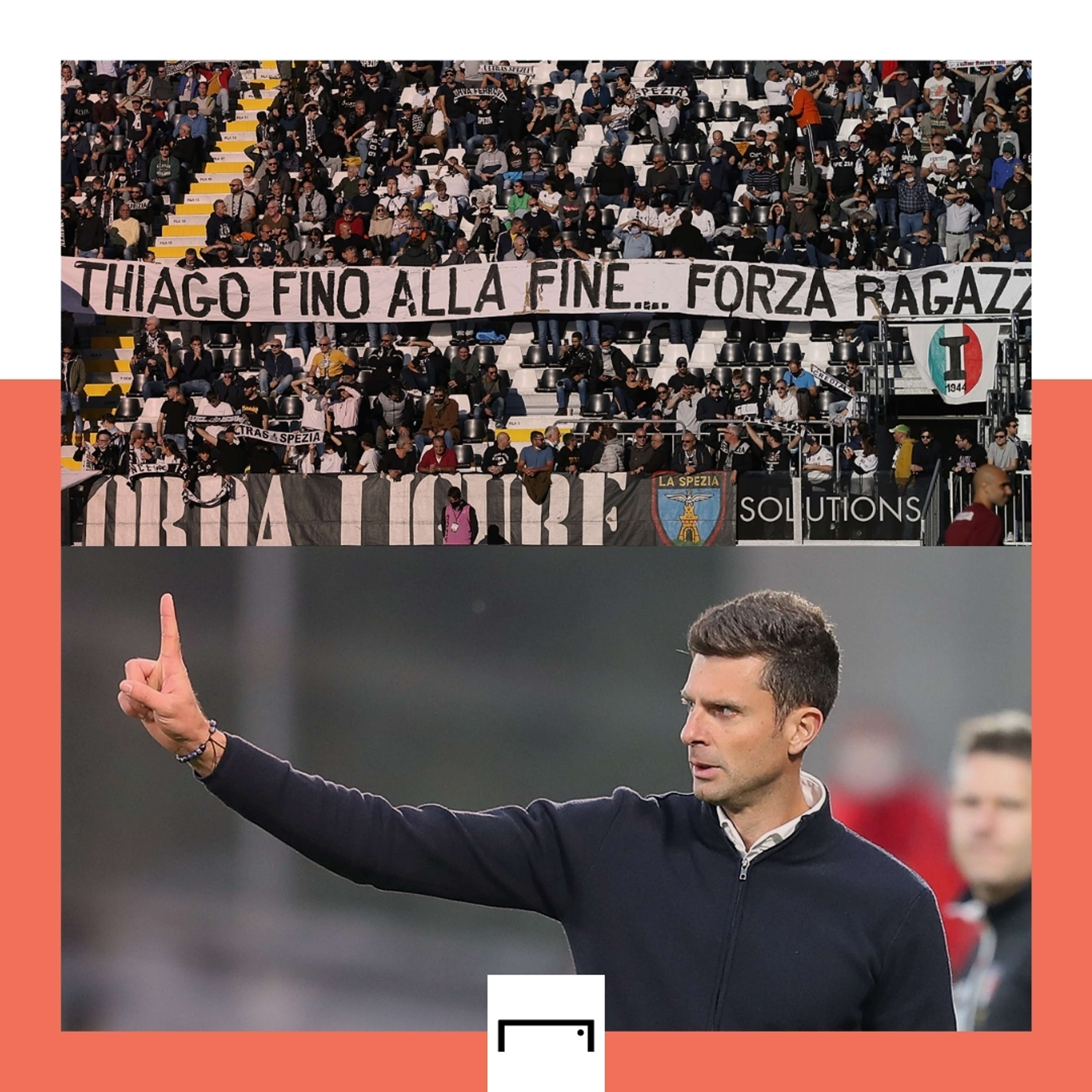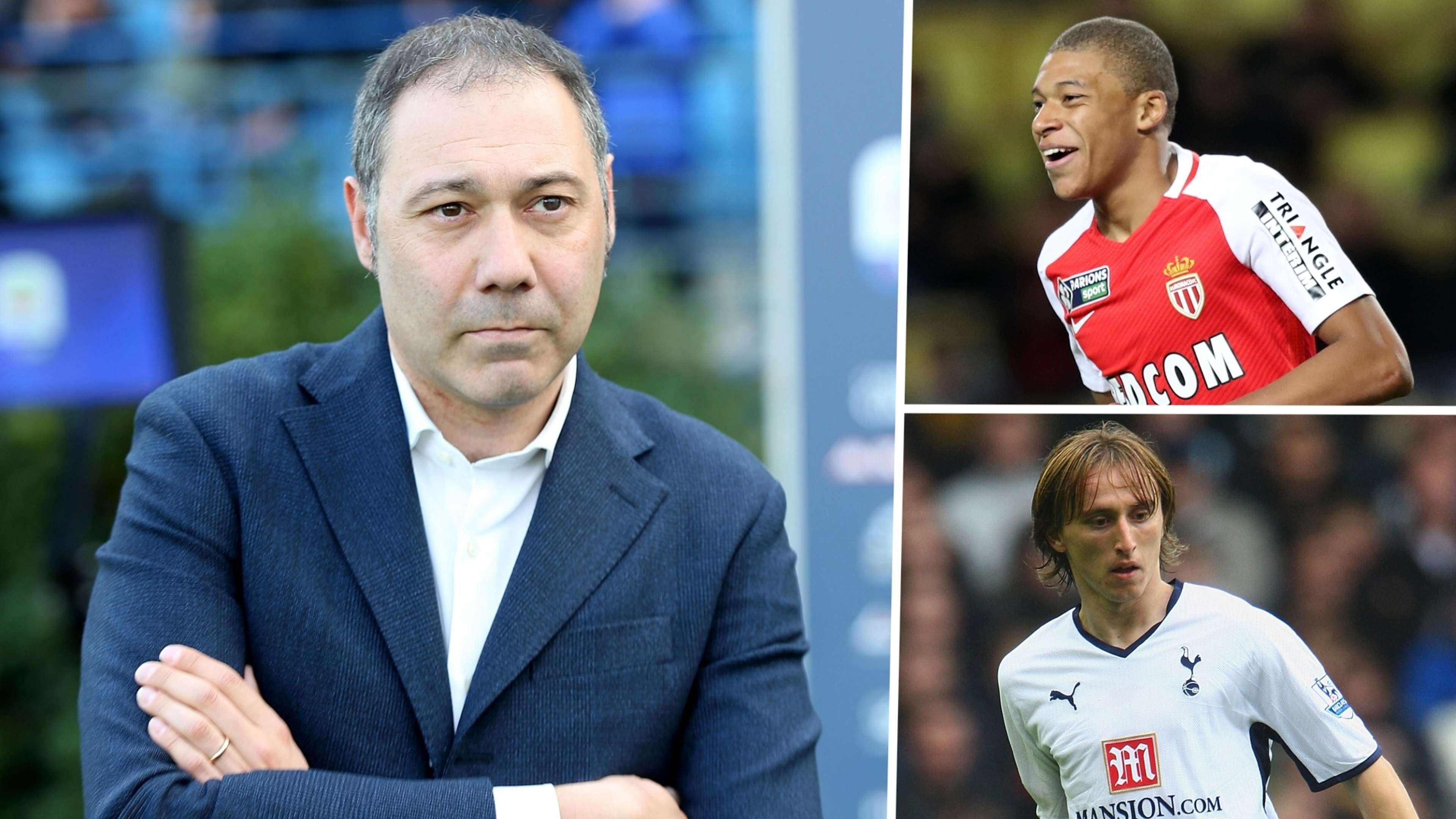Riccardo Pecini may be famous for having one of the best eyes for talent in football but he wants to make one thing very clear straight away.
While he may have signed Kylian Mbappe, he didn't discover him.
"Don't give me credit I don't deserve!" Monaco's former technical director says, laughing, in an exclusive interview with GOAL.
"Mbappe was on a different level as a kid. Everyone in France knew it already. So, it wasn't so much about finding Mbappe, as convincing him to join."
But Pecini's decisiveness was key in that regard.
Monaco's head of recruitment had come to see him one day in 2013, armed with a list of 10 players and a DVD.
"He said that none of these players would cost any money to sign – except one, called Kylian Mbappe. And when I saw the fee, it seemed a bit much to me," Pecini admits.
"But the head of recruitment said to me, 'You have to see him'. So, we watched the player together and I said, 'Whatever we have to spend, we'll spend! Go straight there!'
"He jumped on a plane, went to the home of the boy and quickly returned with Mbappe and his family. So, the head of recruitment did very well; I only authorised the deal.
"The scouting was all done by the academy and when I saw Mbappe for the first time, it was easy to decide."
That Pecini wanted to move so quickly was hardly surprising, though.
 Getty/GOAL
Getty/GOALHe had grown up in the world of scouting, so he knew well that speed is of the essence when it comes to identifying and snapping up promising players.
His father Aldo was one of the very first exponents of the craft in Italy and he would take Riccardo along to fourth and fifth division games as a child.
"It would have been difficult for me to have done anything else in life but scouting," Pecini jokes.
Having such an early and insightful introduction to the game played a pivotal role in Pecini forging a career for himself in the game and eventually being hired by Tottenham in 2006.
"I think that experience was the most important for me from a scouting perspective. I learned to work in a certain way starting from there," he explains.
"We were three or four scouts in total, we were working a lot and very well coordinated, under a sporting director, Damien Comolli, who believed a lot in our work.
"I think that the model that we put in place and developed at Tottenham allowed us to bring in players like (Luka) Modric and (Dimitar) Berbatov because we were all working in perfect harmony."
Pecini, though, played a particularly prominent role in Modric's transfer from Dinamo Zagreb to Tottenham in 2008.
"When I saw him for the first time, he was playing in Bosnia (on loan to Zrinjski Mostar in 2003-04) and I remained in a state of shock because he was just a baby, less than half the age of the other players. He had an extraordinary talent, though," Pecini enthuses.
"Then, we scouted him for two years and the more he grew, the easier it became for him to play in a league where it wasn't easy for young kids, physically.
"From there, he became an international and we followed his journey and his development closely, but, from the first day I watched him play, I was convinced that I had seen a champion.
"Damien came with me to see him four or five times. We spoke with the boy. Then, at the moment it came to make a decision, (Spurs chairman) Daniel Levy and Damien did very well to convince Dinamo to give him to us because, as a client, they weren't easy [to deal with]."
 Getty/GOAL
Getty/GOALUnsurprisingly, given the part Spurs played in his journey from scout to sporting director, Pecini retains the utmost respect for the north London club, whom he now believes could return to winning ways under new coach Antonio Conte.
"I don't know Conte personally but I've seen the work that he's done and it's incredible," he says.
"Also, I have worked with (Tottenham's director of football) Fabio Paratici before and I'm happy that Conte will have people of the highest calibre to help integrate him into the club.
"And then, I think that Tottenham, from a structural point of view, are among the game's elite. It's one of the best clubs in the world.
"It could well be that Conte has exactly the right characteristics to get Tottenham winning again because, remember, they were playing in the Champions League final two years ago, so the gap between them and the top teams is not so big."
It's tougher for smaller sides, obviously. Mastering the transfer market is key and Pecini is an expert in that regard.
At Sampdoria alone, he signed the likes of Patrik Schick, Lucas Torreira and Milan Skriniar for small fees and sold them for big money, earning himself the nickname 'L'uomo delle plusvalenze' (the profit man) in the Italian press.
Pressed to pick his most rewarding deal, from a personal perspective, he takes some time to think.
"Because we were always lucky enough to bring in great men, rather than just great players, it's difficult to say that one was better than the other," he explains.
"But maybe Skriniar was the most satisfying signing because, at the start, when he first arrived, he had a difficult relationship with the coach at the time.
"It was also a difficult transfer. I went to Slovakia about 20 times a month! I couldn't do it anymore! But the pay-off arrived very soon after.
"So, I'd put him as our No.1 transfer at Samp because of how he was as a kid and the fact that I know that he had to fight to earn his place. Indeed, in my opinion, he has to be an example for everyone to follow.
"It was also an example of how a deal should work in terms of the scouting work, managing his training program, and the capacity of the boy to understand his work and to have patience – all of which combined carried him to the highest level."
Pecini is now hoping to replicate that success at Spezia, but it won't be easy.
He was installed as the Ligurians' Chief Football Operations Officer last summer and to say it was a baptism of fire would be something of an understatement.
"I learned the day after I arrived that the coach (Vincenzo Italiano) wanted to leave! So, we haven't stopped working from the first day," he says.
"But I've been very happy to find an environment in which everyone has a great desire to work, and this makes me smile. I'm very happy here and I'm very satisfied with how it's gone until now."
He's certainly pleased with one of the first, and most significant, decisions he made to date: hiring Thiago Motta as Italiano's replacement. It was certainly a bold choice on Pecini's part.
The former Barcelona, Inter and Paris Saint-Germain is only 39 and his first job as a head coach, at Genoa, ended with him being sacked after just three months in charge.
Motta, though, is an intriguing and innovative character, who previously made plenty of headlines by advocating a 4-3-3 formation that could be interpreted as a 2-7-2 during his time in charge of PSG's Under-19s.
The former Italy international hasn't done anything quite so radical at Spezia but Pecini is full of praise for the way in which the coach has managed to focus on his job after a turbulent start to this tenure which saw the club hit with a transfer ban 11 days after Motta's appointment.
 Getty/GOAL
Getty/GOAL"Even when he arrived, he did around 20 days of quarantine, without friendlies or training, so it was difficult for him," Pecini admits.
"But he managed to concentrate solely on his work and not on all of the problems that we had. So, I think he's happy here. And we're getting on well.
"When we were looking for a new coach, we tried to analyse those candidates that could be compatible with the philosophy of the owners’ project, with my ideas of football, and, above all else, trying to find a coach capable of implementing a style of play that fit with the culture of Spezia. That was the most important thing for us.
"We analysed some profiles and we watched many games of the two or three coaches that we, let's say, focused on. In the end, Thiago, was the one that met all of our criteria.
"We had four or five meetings with him and, eventually, we decided that this could be the right project for everyone concerned."
Motta definitely fits with Spezia's youthful profile.
With the transfer ban coming into effect in January 2022, Pecini was very active during the summer window, bringing in a number of players on loan.
The net result is that Spezia boast the youngest squad in Europe's 'Big Five' leagues.
Unsurprisingly, they endured a tough start to the 2021-22 campaign but have secured their Serie A status for another year.
Pecini, then, is feeling optimistic about the future.
"We have a young team, it's true, but we also have experience," he points out.
"For example, Giulio Maggiore is still only 23 but has played a lot of games for the club and is a very important player for us. He brings us that level of experience on the pitch that we need.
"And then we have very young guys like Suf Podgoreanu, who's growing a lot, even more than we expected.
"I believe that the advantage, or good fortune, that I have had in the past was working with recruitment groups that were very, very qualified, which allowed us to sign or find very good players and make very good decisions.
"We’ve implemented that same approach at Spezia, because we know how to do it, and we assembled the squad with this same kind of culture and work ethic.
"I must also say that the owners, the Platek family, are key. They started to invest in a long-term project from the moment they arrived at Spezia.
"They’re coordinating a reconstruction of a sector of the stadium, they're investing in youth, they developed an organisation and structure that went from Serie B to Serie A in one month because Spezia was promoted in the year of Covid. Their Serie B campaign finished on August 20 and then they started playing in Serie A on September 27.
"Obviously, the club restructure needs a bit of time, but it started as soon as the Platek family arrived and they have a dynamic and clear vision for the club, and this allows us to build towards the future, so it’s very invigorating for everyone in every sector.
"The results come at the end, obviously, and we're only at the start. But I'm confident that players will also arrive here that can have a great future in football."
Indeed, given Pecini's track record, maybe in a few years' time he'll have another story to tell about how he managed to persuade the new Mbappe or Modric to sign for Spezia...
